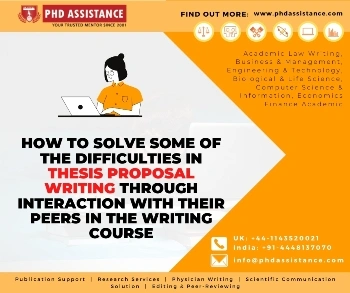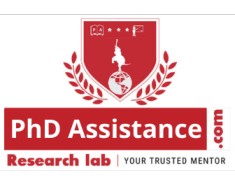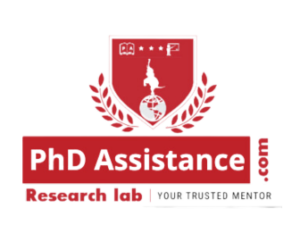How to solve some of the difficulties in thesis proposal writing through interaction with their peers in the writing course
In-Brief
- Peer interaction is the interactive part of the Research Proposal Writing that mainly focuses on the issues of analysis, significance, and progress.
- Peer Assessment lets students assess one’s own work and the work of their peers which allows the audience to visualize a single process in different ways.

Introduction
The important thing in a graduate student’s life is thesis writing. Through the Thesis Proposal Writing process, the students learn how to carry out the research and report the result. The first step to being performed in a graduate student’s life is research proposal writing. In the process of developing the research proposal, the students cannot detach themselves from the research community. During the process of proposal writing, students should consult with their supervisors about their difficulties and progress in writing. During the process of developing thesis proposals, students identify the ways to solve problems that occur while writing and improve their academic writing skills in research. They also gain experience in performing research through the interactions and discussions with other members within the research community. They would then steadily shift from marginal participation to complete participation in their research community.
Difficulties in writing thesis proposals
In writing the research proposal, the students mainly had difficulties in identifying and deciding the Research Topic, creating a reasonable design for research, logically sorting out their writing, and generating an important review of previous studies, and has enough academic knowledge.
Peer Interaction: Besides getting assistance from their supervisors, students must be able to solve some of their difficulties in Research Proposal Writing through their peer interaction in the course of writing.
While much less scrutinized, a pedagogically and hypothetically stimulating the fact of peer interaction is that students tend to correct the errors on their own more while discussing with each other than when they make it on their own.
The interactive part in the Research Proposal Writing process that focuses mainly on the substantive revision issues of analysis, significance, and progress is termed as peer review. Holistic commentary is used in this part that encourages students to perform an active role to form questions to direct the audience in further enhancement of their writing. Comments gathered on the student’s research work through the Peer Review process can also permit for teacher-guided, directed feedback. This type of learning allows students for evidence of one’s own work by looking at the other’s work. In this interaction, students use critical thinking in their writing by gainfully engaging in inquiry methods and reflection with the research community. Based on the peer interaction organized by the supervisor, important elements can be integrated into this interaction.
Thesis proposal writing allows students to learn the writing process and also allows them to engage in the act of writing to enhance their writing skills. This act is supported through peer interaction, and it is through this process and the utilization of peer interaction, the meaningful development in students writing skills and critical thinking are utilized.
Peer interaction to solve proposal writing difficulties
Assessing one’s own work and the work of their peers allows the audience to visualize how one process can be explained in various ways. Ideas and viewpoints on a specific set of actions can further strengthen the content of chronological facts through recurrence, suggestion, and analyzing others’ work to offer different points of view.
The awareness and critical analysis of an individual student and the research community are improved greatly through peer interaction as it serves many roles. Peer interaction improves the writing ability of a student as it critiques others’ work which ultimately leads to the internalization of standards and the ability to assess one’s own work. Interaction with peers also yields extra benefits to both the students and to the research community at large.
Without peer interaction, the purpose of writing is void. Study shows that several peer assessments are the most precise and give in assessments that are on average, similar to the supervisor, while also getting more feedback. Enclosing contradictory assessments can be terrible for several reasons; most importantly that students cannot gain knowledge from the errors committed by them if there is no clear idea or consent about those mistakes and have no knowledge of how to correct those mistakes. In addition to the accurateness, it is also essential to think about whether the assessments are constant or reliable, among and between student evaluators. Peer evaluation that is conducted in the Research Proposal Writing process did not show a large margin of variation and that while students were not always reliable with the specificity of the mistakes they identified. But these inconsistencies were not sufficient to influence the overall grades of the thesis proposal writing.
In peer interaction, students not only point out the weak points but also comments on the strong ones. The students’ interaction in the peer review process encourages self-confidence in students’ ability to write. Students achieve their confidence by learning from others’ work. Then they can understand, analyze, and evaluate their proposal writing based on the evaluation of others. In other words, students can learn to improve their writing skills by reviewing each other’s work. The peer review is suitably done in the draft and final thesis work.
There are some other benefits in Peer-Reviewing while writing. It provides students with an opportunity to practice cooperative learning among them. Peer evaluation is a precious tool to use in students’ thesis writing. Peer assessment activity that has been designed carefully includes a clear path concerning actionable comments, and also provide students with useful comments that enhances their performance on proposal writing. The process of peer interaction and evaluation lets students grant and receive comments on their work by spending minimal time with the supervisor. It is also an attractive tool to use in the present era of the ever-increasing strength of the classes and workloads of the faculty. However, students are mainly benefitted through peer assessment.
Conclusion
Peer Review allows students to practice cooperation among peers to enhance their own writing skills. Moreover, peer review is an activity that greatly reduces the stress of students. Students may also verify, converse, and assess their work with peer members without thinking or fearing about the grade from supervisors. In such peer activities, students feel free to share and support their ideas for the progress of their writing. If the students create mistakes, it will not affect their grade. In brief, peer interaction is a pleasurable activity in the writing process.
References:
- Yen Polisda, 2018, The Effect Of Peer Review On Students’ Argumentative Essay Writings.
- Ashley Landry, Shoshanah Jacobs, Genevieve Newton, 2019, Effective Use of Peer Assessment in a Graduate Level Writing Assignment: A Case Study.
- Terence A. Sheppard, 2019, Social interaction and academic performance.
- Sonia Dutta Gupta, Fatimah Abdullah, Gu Li, Yang Xueshuang, 2019, Peer Assessment in Writing: A Critical Review of Previous Studies.
- Masatoshi Sato and Susan Ballinger, 2019, Understanding peer interaction Research synthesis and directions.



